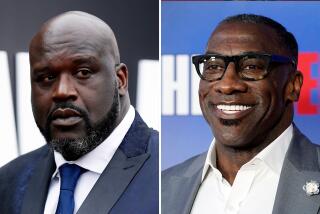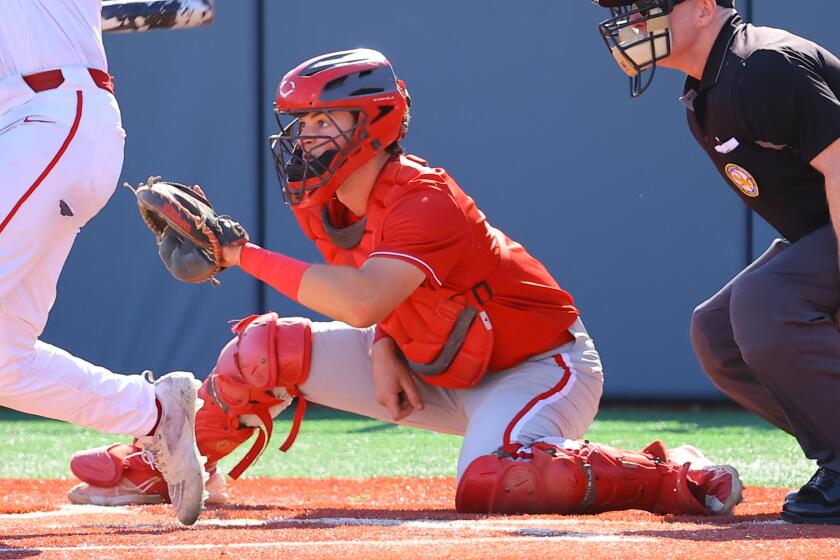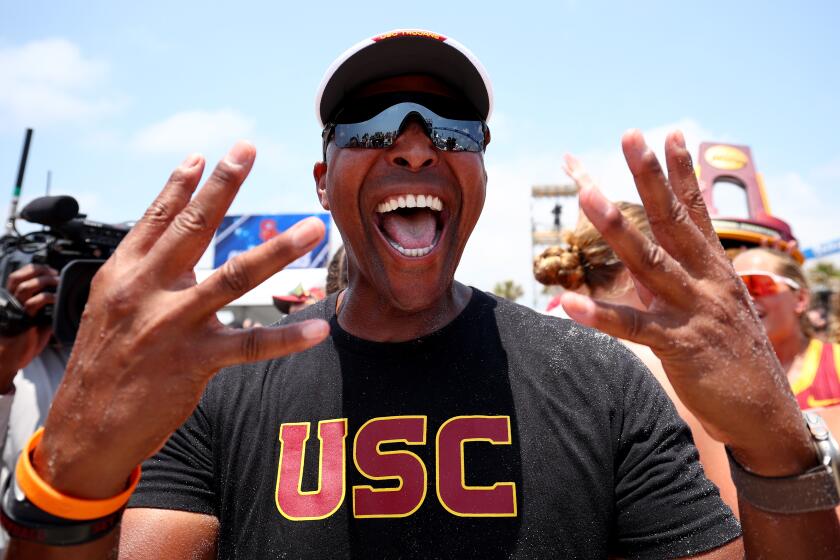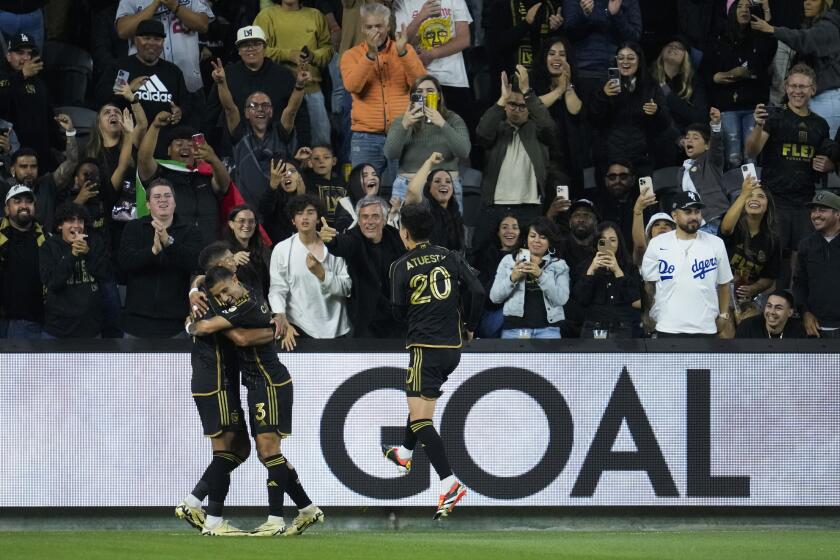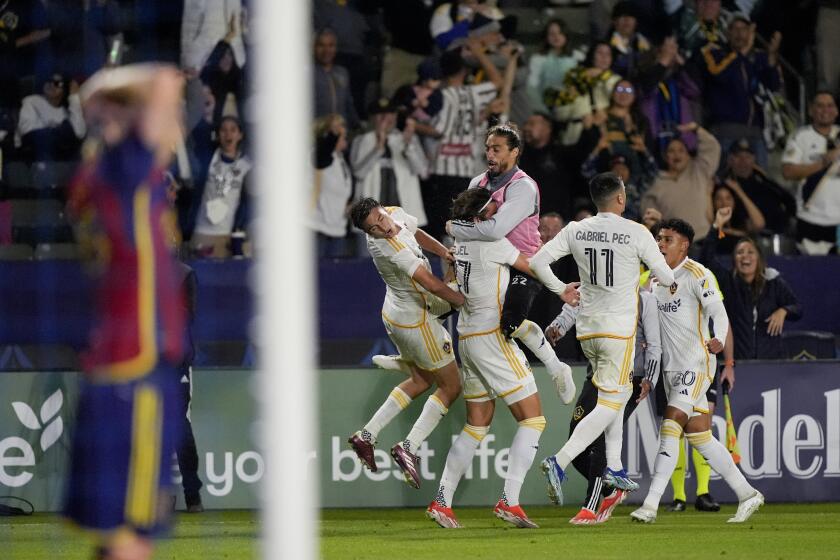Scout Must Be Whether Man : He Must Determine Which Way Wind Is Blowing in Draft
They spent months crowding ballfields like second-graders over a jar of flies, scrutinizing every move made by the finest college and high school baseball players.
Now, with the major league draft Thursday, scouts are immersed in a less visible but no less vital part of their job--determining each player’s “signability.”
Will a hotshot high school or junior college player choose pro baseball over a college scholarship? Will a college junior sign for a six-figure bonus, or return for his senior year?
Inquiring minds in the front office demand answers.
“It’s time to bring out all our guns and fire all the bullets,” said Kevin Malone, general manager of the Montreal Expos. “We have to know, does a guy want to play?”
A scout does more than lounge in the stands wearing a wide-brim hat and a poker face, pointing a radar gun at home plate. The job begins and ends with providing information to his employer, but it involves more frustration than the typical job that pays about $30,000 a year.
This much Scott Stanley learned last year, his first on the job as the Expos’ territorial scout in Southern California.
Stanley, who lives in Canyon Country, was named the Expos’ scout of the year for his dogged work convincing Brad Fullmer, a power-hitting third baseman from Montclair Prep, to take $417,000 and give up a scholarship to Stanford.
Finding Fullmer was easy--every scout in Southern California knew of him. More difficult was accurately predicting his signability.
Numerous discussions with the Fullmer family convinced Stanley that Brad would sign. Next, Stanley had to persuade the Expos to select him, and he made his final pitch 10 minutes before the draft. They picked Fullmer in the second round.
But Stanley’s work was far from over: He had to get Fullmer’s name on a contract.
“This was more time on the phone, playing middle man between the scouting director and the Fullmer family,” said Stanley, who finally signed Fullmer nearly three months after the draft. “I enjoyed it. Being a first-year guy, I got a look at what a tough sign is all about.”
Unlike college recruiters who must follow strict NCAA regulations regarding contact with players, major league scouts are governed by the commissioner’s office in only one area: They cannot mention specific dollar figures to a player or his family before the draft.
Not that the rule isn’t violated.
“With Fullmer, teams went in and started talking money, which was illegal, putting figures in their minds,” Malone said.
A more ethical approach is to offer the family an honest appraisal of the approximate round in which the player will be drafted. Signing bonuses are determined primarily by the round in which a player is selected.
“This is the area of value he will land in,” the scout will ask. “Will he sign under those circumstances?”
If the answer is affirmative, the team can draft the player with confidence.
Although many scouts regard this as merely another aspect of information gathering, personal contact with families is a sales function as well.
“Scouts are competing with college recruiters who clearly represent a high-class organization,” said Ray Poitevint, the Angels’ director of international scouting. Poitevint, a near lifelong Valley resident, was a territorial scout and scouting director with the Baltimore Orioles and Milwaukee Brewers for 32 years.
“Too many scouts are spitting tobacco or wearing blue jeans,” he said. “The scout is that family’s first impression of a major league organization. You have to be at your best to secure the high school boy. You have to sell professional baseball.”
Convincing a player that pro baseball is right for him must be coupled with convincing the front office that the player is right for the organization. Therein lies the frustration every scout faces. Sometimes he feels like a minor part of a major league operation.
Recognizing that a green high school kid has big-league potential is how a scout earns his pay, yet he often watches helplessly as his team ignores the player on draft day.
Every team employs national crosscheckers, scouts who compare the players touted by territorial scouts. A crosschecker might see the top 100 players in the nation, and the top 20 or so are evaluated by the scouting director as well.
Additional opinions are provided by the Major League Scouting Bureau, a collection of scouts nationwide who reports to the commissioner’s office and provides evaluations to every team via computer. The bureau administers personality tests and videotapes the top 300 prospects, allowing a general manager to evaluate players from the comfort of his office.
Although funding for the bureau was cut in half last year, it remains a valuable tool.
“Scouting is all information, and the more information a team has about a player, the more intelligent selection can be made,” said Don Pries, the scouting bureau’s director.
Longtime scout George Genovese, for one, bristles at the idea of so much input.
“If you think a fellow should be picked in the first three rounds, you have to get three to five opinions,” said Genovese, a scout with the San Francisco Giants for 34 years who lives in North Hollywood. “It’s frustrating, because I believe in the old adage: Too many cooks spoil the broth.”
Without crosscheckers or scouting bureau reports, comparing players from various parts of the country would be a guessing game. Yet when those evaluations differ from that of the territorial scout, resentment often results.
“A guy drives 40,000 miles in a year, then gets one pick in the 20th round,” said a former scout. “That’s the big burnout of scouting. They have pride, competitiveness, they want to see their players in the big leagues.
“Then they watch players who they recommended move up in other organizations.”
Malone, the Expos’ 36-year-old general manager, broke into baseball as a territorial scout with the Angels in 1985. He retains a high regard for the judgment of scouts.
“If a crosschecker and a territorial scout differ on a player, I’ll often trust the guy who has seen the player several times,” he said.
Pride notwithstanding, a scout caught up in tallying players drafted from his territory can be doing his team a disservice.
“To develop a championship club, every scout has to be unselfish,” Poitevint said. “The organization has to come first. You can bring 100 players into the farm system, but if they are not qualified, you are developing a second-division team.
“With Baltimore, we’d root for one another. If a territorial scout somewhere else said a certain player was gonna help get us to the World Series, we’d say, ‘Well, let’s go after him.’ ”
But radar-gun readings aside, evaluating ability is essentially subjective. Most scouts use the same rating system, grading present and future ability on a scale of two to eight. A high school player typically will be projected to improve more than a college player.
“The future ability of a college player 21 years old won’t be much greater than what he is showing today,” said Sterling Housely, a Houston Astros’ scout who lives in Canoga Park. “Top high school players, though, have a high ceiling, high projectability.”
In this futures market, a lanky pitcher from Quartz Hill barely old enough to drive probably will be paid more to sign than a scout will earn in five to 10 years.
Every scout in Southern California knows the lanky pitcher is Roger Worley. It’s tough to keep a 90 m.p.h. fastball under wraps. However, startlingly different views of Worley’s major league potential exist. Will he become a gold mine or is he fool’s gold, the proverbial flash in the pan?
Some scouts believe he is beginning a tremendous learning curve, that his place in a major league rotation is inevitable.
Others have serious doubts. One scout says Worley’s mechanics invite arm injury.
Who says what? No scout discusses players on the record, especially this close to the draft. If information isn’t confidential, what good is it?
Worley’s signability, however, is a certainty. He has indicated that playing professional baseball is all he wants.
No doubt every territorial scout in Southern California has filed reports on Worley’s ability and his signability. They have recommended the round in which he should be selected and how much money it will take to get him to sign.
For the scout whose team drafts him, however, the work is not over. As Stanley found with Fullmer, it’s ink or sink, the final pursuit.
“If you don’t sign the player, your team wasted the draft pick,” Stanley said. “This is the player you wanted, and someday you want him to help your team win the World Series.”
More to Read
Get our high school sports newsletter
Prep Rally is devoted to the SoCal high school sports experience, bringing you scores, stories and a behind-the-scenes look at what makes prep sports so popular.
You may occasionally receive promotional content from the Los Angeles Times.


